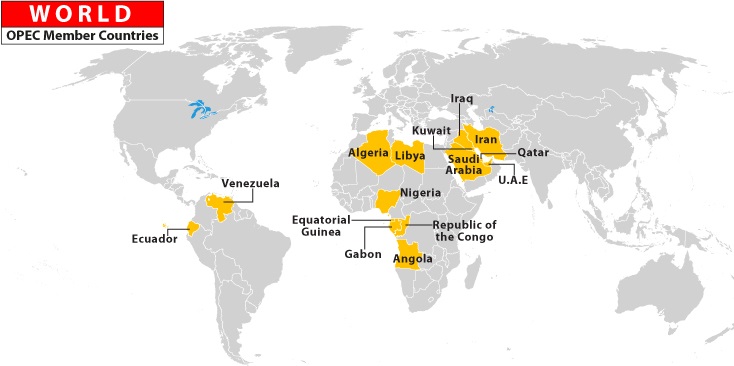International Relations
OPEC +
- 16 Nov 2019
- 3 min read
Why in News
According to the International Energy Agency (IEA), the Organisation of the Petroleum Exporting Countries (OPEC+) plus might face sharp demand fall due to a recent surge in crude oil production from the countries like USA, Norway, and Guyana.
- The non-OPEC countries which export crude oil are termed as OPEC plus countries.
- OPEC plus countries include Azerbaijan, Bahrain, Brunei, Kazakhstan, Malaysia, Mexico, Oman, Russia, South Sudan and Sudan.
Organization of the Petroleum Exporting Countries (OPEC)
- The Organization of the Petroleum Exporting Countries (OPEC) is a permanent, intergovernmental organization, created at the Baghdad Conference in 1960, by Iran, Iraq, Kuwait, Saudi Arabia, and Venezuela.
- It aims to manage the supply of oil in an effort to set the price of oil in the world market, in order to avoid fluctuations that might affect the economies of both producing and purchasing countries.
- It is headquartered in Vienna, Austria.
- OPEC membership is open to any country that is a substantial exporter of oil and which shares the ideals of the organization.
- Gabon terminated its membership in January 1995. However, it rejoined the Organization in July 2016.
- As of 2019, OPEC has a total of 14 Member Countries viz. Iran, Iraq, Kuwait, United Arab Emirates(UAE), Saudi Arabia, Algeria, Libya, Nigeria, Gabon, Equatorial Guinea, Republic of Congo, Angola, Ecuador and Venezuela are members of OPEC.
International Energy Agency
- The International Energy Agency (IEA) is an autonomous organisation which works to ensure reliable, affordable and clean energy.
- It was established in the wake of 1973 (set up in 1974) oil crisis after the OPEC cartel had shocked the world with a steep increase in oil prices.
- It is headquartered in Paris, France
- The IEA has four main areas of focus, i.e. 4Es:
- Energy security,
- Economic development,
- Environmental awareness and
- Engagement worldwide.
- India became an associate member of the International Energy Agency in 2017.
- Mexico officially became the International Energy Agency’s 30th member country in February 2018, and its first member in Latin America.







